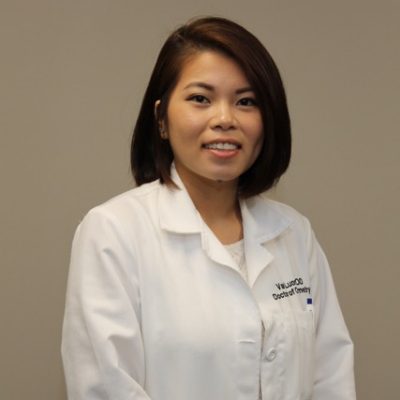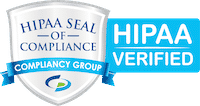Dr. Luong received her Bachelor of Arts degree in Interdisciplinary Science from Arcadia University and earned her Optometry degree from Pennsylvania College of Optometry at Salus University in 2018. She achieved clinical honors during her externship rotations at this very practice in Burlington, NJ; Scranton, PA; Wilkes Barre, PA; and Miami, FL which all focused on primary care and ocular diseases. Dr. Luong is a member of both American Optometric Association and Pennsylvania Optometric Association. She is licensed to practice in both Pennsylvania and New Jersey.
What got you started with myopia management? And maybe you could share a little bit about how it became an interest and where you developed your expertise in it?
So I kind of got into it when I was in school and I heard about Ortho-k lenses. For the past seven years now, throughout the practice, I’ve been seeing a lot of kids at our office and everyone’s nearsightedness. So why don’t we bring this into the office and try to do eye drops? I mean, my major thing is doing ortho-k for the little ones because I feel like it’s actually helping. As an example, my prescription hasn’t changed at all. So I think that’s how I warmed up to the whole concept.
So you wear ortho-k lenses yourself? What’s been your experience with them?
Yes, I wear ortho-k lenses myself, and my experience has been great. No side effects, even though I wear them every single night. I’ve been fitting a few patients in them as well, and their experiences have been similar to mine. No issues so far. Their prescription hasn’t changed much so far, thanks to ortho-k..
Maybe you could share a little bit about the treatments you offer and how do they differ?
So we do atropine drops, which is the dilation drops for the younger crowd who can’t wear contacts yet, and that is to help control their accommodation throughout the day. Because of nearsightedness, essentially their prescription is fixed for far distance. But over time, because they’re wearing their glasses full time, they’re over-accommodating for their close-up activities at school. So the eye drops help combat this by relaxing accommodation, which will hopefully slow down changes that may cause myopia.
As the child gets older, we would move more toward soft contact lenses, or ortho-k for the ones who don’t want to wear contacts or glasses at all anymore. They can just sleep in the specialized rigid gas permeable ortho-k lenses at nighttime, and it’ll correct their vision as they sleep. They can simply wake up in the morning, and have clear vision without contacts or glasses.
Do you decide for the patient what myopia control method they want, or do they decide for themselves?
When deciding which method to go with, we lay out all of the options for them, and ask the patient to see what they’re comfortable with. This is especially true if they’re doing sports or similar activities. Some little ones are hesitant to try out contact. So we choose the best option for them based on what their prescription is, and what they’re most comfortable with. We never push something that the patient says they don’t want or aren’t interested in.
For patients who are interested in contacts, how do they decide between going with the multi focals or ortho-k?
There are a few factors. What activities are they involved in? Do they want to wear their contacts on a daily basis? Also, the patient’s prescription plays a role, because ortho-k only goes up to a certain prescription strength. Cost is often also a factor when deciding.
What do you think parents need to learn about myopia and the importance of myopia management?
They need to know that everyone’s on screens right now for way longer than is healthy, especially with the COVID pandemic. And that’s really harmful for everyone’s eyes.
Parents also need to know that myopia can take a toll on their child’s eyes that goes way beyond just not being able to see clearly from far away. The eyeball itself kind of grows as you age. So as your child becomes more nearsighted, their risk grows of developing eye diseases like glaucoma or cataracts. As the eye grows, the structures of the eye also stretch, so something like retinal detachment also becomes more likely as the eye gets elongated.
Myopia management prevents the eye from growing too quickly, minimizing the risk for disease.
How do you speak to parents and kids about myopia management? Do you talk to the parents first, or everyone at once?
I’m a visual person, so I kind of explain it in the same way it works in my head. So I use visual aids, and the parents will usually get it. And speaking to the kids, it’s just helping them see it’s important to wear their glasses by showing them what their vision is like without it.
I try to get the kids excited, make them feel empowered, like this will be great for everybody. Like with braces, for example, even though it’s a different industry, there’s a whole bunch of hesitation because you have to wear these things in your teeth. But in the end, you kind of know that it’s important. So for kids, it’s like they don’t want to do it, but they want to do it. It’s a very tough decision, but I find in eye care, it’s like the opposite. They often either want to wear glasses or they want to wear contacts. It’s always positive. It’s an interesting switch.
Is there anything that you feel that you’d like to add about my management that you’d like to maybe have us include on that section of the site?
I wish people could know more about myopia control, because every time I bring it up in the office, no one hears about it at all. So just kind of want to make it out there. That it’s been around for at least ten or twenty years already.


